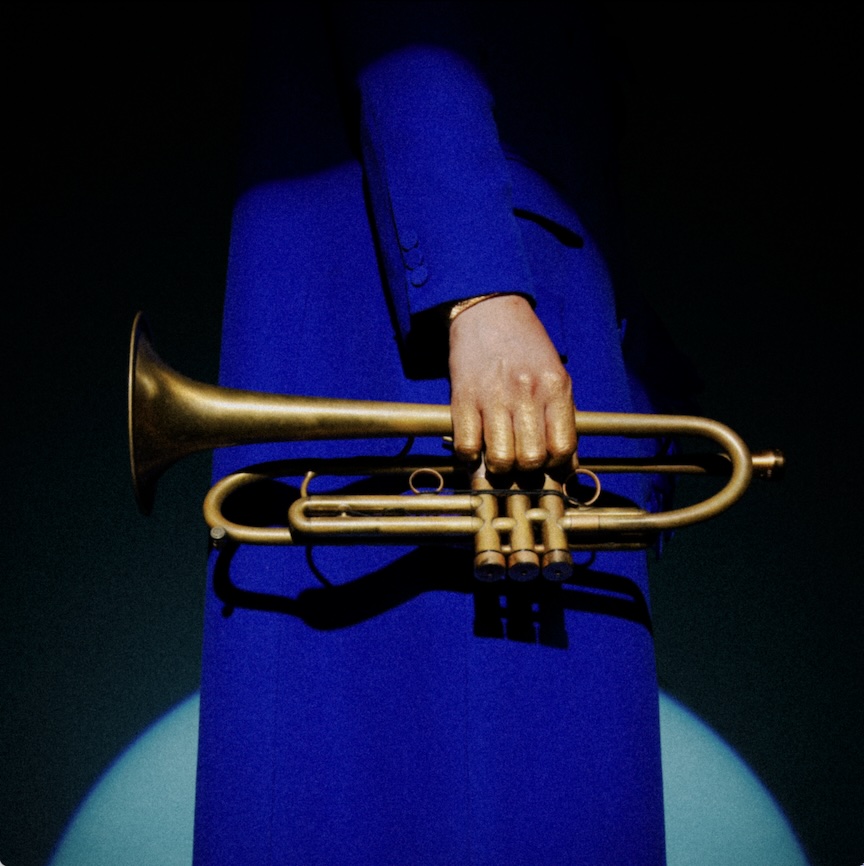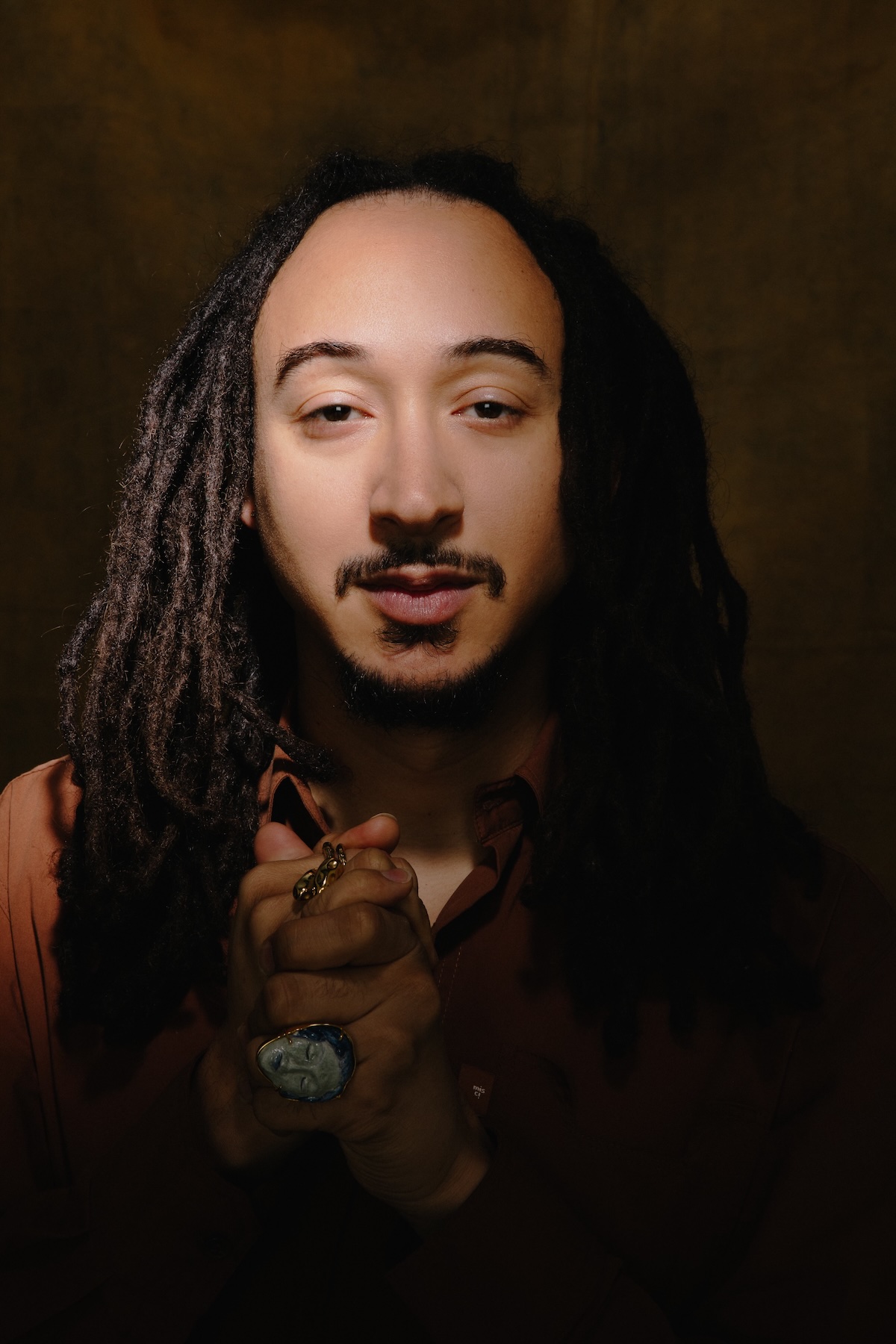“Yeah, trumpet’s a motherfucker,” Theo Croker says with a chuckle when I express amazement at the range of sounds a skilled musician can get out of an instrument with just three valves. “Y’know, the pitch of the notes is determined by the shape of the aperture, which is the hole that you create with the lips, and the speed of the air and the size of the hole. So the trumpet has infinite range, it’s really up to the individual player. It’s an adventure, we can say that.”
Croker’s adventures with the trumpet have taken him around the world and across a wide range of sounds. His latest album, Dream Manifest, was released in June, featuring guest appearances by veteran jazz saxophonist Gary Bartz and R&B singer Estelle. I called the 40-year-old trumpeter in New York City one morning in August while he was finishing up five new tracks for the deluxe edition of Dream Manifest, out on Dom Recs October 24. “This is the fastest I’ve ever made an album. I made this whole album in 12 days, and I had very little written beforehand.”

The presence of synthesizers, looped beats, and digital effects places Dream Manifest in an eclectic modern context. But the foundation of the album is still Croker improvising with his rhythm section, and then editing the longer jams down into something succinct and compelling. “A track like ‘64 Joints’ might be six minutes on the record but the actual take is 12 or 13 minutes. And it’s us playing it over and over again without stopping, start to finish, start to finish, start to finish, but you’re maybe hearing the third time we played it,” he explains. “I don’t have eight takes of something, I have one long take.”
The five new tracks on the deluxe edition are “songs that didn’t make it past the finish line” during the initial sessions that he got to revisit and complete with more guests, including rapper IDK and the British duo Blue Lab Beats. “Two days ago, I overdubbed a solo over an interlude I created. But the first solo I did was the one we kept, because I want things, even if it’s an overdub, to still capture that raw improvisational energy.”

Croker’s open-minded approach to jazz has allowed him to move freely between genres, and he’s played on albums by hip-hop stars like J. Cole and Common. In August, he made a somewhat surprising appearance on the popular YouTube series A Colors Show, which has helped launch the careers of rappers and singers like Doja Cat and Billie Eilish. This time, it was just Croker and his trumpet in front of the microphone and an elegantly simple monochromatic backdrop.
“I was like, ‘I wanna play an R&B melody, it’s not really about soloing, I don’t really wanna solo so much.’ I just thought that would be cool, give people a change of pace in general on that platform. But also a change of pace from what they would hear from a trumpet player, to be really disciplined and focus on a melody, a melodic statement versus showing someone how fast I could play,” Croker says. His A Colors Show performance was an instrumental version of “Wrapped in the Weight,” a song that will appear on the deluxe edition of Dream Manifest with a vocal by Anais Reno. He’s also pretty pleased that Fat Beats Records, the hip-hop label owned by the legendary New York record store of the same name, handled the vinyl release of the album. “I’m very excited and happy to be working with them,” he says.
Theo Croker didn’t always think outside the box this much. He was born in Florida, the grandson of legendary jazz trumpeter Doc Cheatham, and he was mentored by another master of the instrument, Donald Byrd, at the Oberlin Conservatory of Music. Croker’s first two albums, 2006’s The Fundamentals and 2009’s In the Tradition, drew on his command of jazz history and featured standards like Duke Ellington’s “It Don’t Mean a Thing (If It Ain’t Got That Swing).” “I wasn’t thinking about stuff the way I think about it now,” he says, “I think it laid a foundation for my musical integrity and character to even play songs that old, or to be that straight ahead.”

Interestingly, it was six years Croker spent in China from 2007 to 2013, playing residencies in Shanghai, that broadened his horizons. “I was hired to come there with a band and play six nights a week, three shows a night. And that’s when I started to incorporate other elements and things into what I was playing, because in that setting, people considered jazz to be everything that was Black. So R&B, hip-hop, all that stuff was jazz to them,” he says. “So in order to engage the audience more, I started to incorporate other things, hip-hop beats and R&B covers, y’know, in the jazziest way possible.”
Croker returned to America with his new perspective after signing with Sony for his 2014 album AfroPhysicist. “It was time for me to come home and start to build in the states again,” he says. His more experimental work won him a wider audience, and his 2019 album Star People Nation was nominated for a Grammy for Best Contemporary Instrumental Album.
On the 2022 album Love Quantum, Croker rapped on the provocatively titled song “Jazz is Dead” to make his philosophy about the genre’s future explicit: “We’re the truth torch bearers, open your eyes / Ain’t gonna let these institutions teach my culture to die.” Given his family background and academic career, he has respect for the old ways of doing things, but he’s determined to keep shaking the genre up. “I understand why people stick to the traditional aspect of it. It’s become so institutionalized and gentrified that if you’re not being contemporary and honest with it, culturally it’s like missing something. It feels imitative of the past, y’know?”


Leave a comment